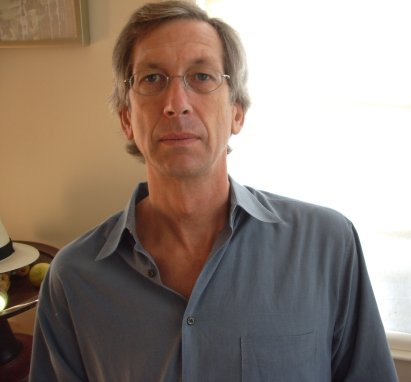I’ve heard of the press Tolling Elves before, tho I’m not sure where. Lollipop, the list of little press publications of the U.K., characterizes the press as “Edinburgh-based visual poetry ” tho the return address on the item I received is listed as London & I wouldn’t call what I have in hand visual poetry at all, being a sequence of 14 poems entitled Not Even by Kit Robinson, augmented with a centerpiece of one black & white photograph by Ericka McConnell (who also took the photo of Kit above). I’d be tempted to call this a chapbook, but it weighs – and I mean this literally – perhaps one-half ounce, being printed on two pages of the thinnest newsprint, 9.5 inches high, 8.5 inches wide, saddle stapled, but then folded into quarters which enables it to be folded into a clear plastic envelope, which I think is how I will end up storing my copy. It almost feels like a test: lets see just how ephemeral & ethereal a book might be.
The poems, however, are solid. They’re all short prose works, four of them a single paragraph long, the rest in a series of quite brief paragraphs. Viz “Evidence”:
The inhabitation of a weird head.
I’d like to go there with you.
A tracery of round, empty thought, put down in a moment, lost, even as it is found.
Persistence, evidence of persistence.
Like Hemingway in a duck blind, waiting in pre-dawn silence for something to show itself and the excitement of bringing something back. The kill.
There is nothing I would point to.
Superficially at least, this is a simple poem. Each of the last four paragraphs could be said to “demonstrate” or otherwise intersect with the title. The first two offer instead sort of a push-pull of desire. One might read the poem as a whole as the contemplation of what reference might mean for others, behind which lurks that old philosophical conundrum that Sartre once defined as Hell: Other people. It is not an accident here that in the most “concrete” of paragraphs, the critical noun – it occurs twice in the same sentence – turns out not to be duck but something. Redefined in the next sentence fragment – this is the only two sentence paragraph here – not by what it is or was, but only by what has happened to it: The kill.
Thus the nothing of the final paragraph is the direct descendant of the round, empty thought three paragraphs before. This is a text constructed around an absent center & it reminds me of nothing less than my favorite line from all of Shakespeare, the last words of Edgar’s soliloquy in the woods in the third act of King Lear: Edgar I nothing am. That sentence is constructed not syntactically, but rather as a series of concentric circles, beginning with the most exterior, ending with the most interior.
“Evidence” is even more tightly constructed than that soliloquy as a whole – it is, for example, hardly an accident that the final phrase focuses precisely on reference’s proposition. There are so many such moments here – one could write an entire paper on the choice of the word tracery & likewise argue that this poem more than anything is “about” persistence. How persistence gets us past the problem of immanence, the constantly discontinuous present: here here here. Persistence is what gets us all the way across that blank chasm between words to the next one & the next one after that – it empowers syntactic integration & even reference itself. It generates personality out of whole cloth. As I said, this is only superficially a simple poem.
Kit Robinson’s best poetry is almost always like this – utterly straightforward until you see that it is as complex & variegated as the
The space inside a lower-case e. You could set up shop there. We breathe through these holes, look out through these portals. Language clothes us in a foam. Its minute bubbles admit light, give off heat, combine to pack a wallop. We live in this vast complex built out of units comprising next to nothing. Cascading granularity moves, forward and to the right.
Language clothes us in a foam. That metaphor, that flight of fancy, counterbalances all this literal looking at the letters as they clatter past. Again we experience desire here as a push-pull dynamic. The result is that I experience that final phrase with enormous physical force – I am in fact feeling precisely what my own consciousness is doing. I am nowhere elsewhere.
This is why I’m always reading Kit Robinson’s work the instant I get it – he & Rae Armantrout & Robert Creeley are probably the only poets about whom I can say that & mean the word always literally. Not Even is the heaviest half-ounce of poetry I’ve ever encountered. And it makes me dizzy with joy.






